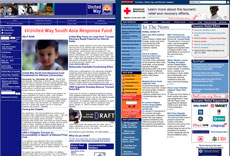Volunteers aid tsunami victims

Tim Eggerding
Jan 17, 2005
Last updated on May 11, 2016 at 05:59 p.m.
While the notorious tsunami that stormed into Southeast Asia on Dec. 26 came without warning or any significant opportunity for preparation, national and local organizations are making sure there is a planned course of action for relief.
More than 150,000 people were killed and many are still missing as a result of the tsunami, which was triggered by a large-scale earthquake that began in the depths of the Indian Ocean.
Doctors Without Borders, or Medecins Sans Frontieres (MSF), is one organization working to alleviate the situation. The nonprofit organization, which provides emergency medical aid worldwide to people affected by disasters, epidemics and armed conflict, began sending doctors and supplies to the area less than three days after the tsunami hit.
Kimberly Jurs, president of the University Rotaract Club, a student service organization that is part of the International Rotary Club, said members were planning fund-raisers.
Get The Daily Illini in your inbox!
“We will probably be collaborating with other organizations such as UNICEF and the Red Cross,” Jurs said. “There are a lot of rotary clubs already there helping out and we will definitely be doing whatever we can to support their efforts.”
Jurs said that while most students on campus would probably be interested in helping, monetary restrictions could be a problem.
“Fund raising on campus can be difficult because we’re all poor college students,” she said. “A lot of times students are able to donate their time and not their money.”
As a result, Jurs said, the group would most likely expand its efforts outside of campus in hopes of reaching a wider audience more capable of financial donations.
“As soon as everybody is back from break and in the area, I would expect to see a lot of opportunities to help made available,” she said.
Tammy Lemke, CEO for United Way of Champaign County, said she suspected most people were sending donations to the long-term-focused “United Way South Asia Response Fund” via the organization’s Web site.
“We haven’t had a lot of people actually coming in to donate, but we’ve told people who called that the easiest way to do so would probably be electronically,” Lemke said.
She said the donation link on the site would most likely be active for an extended period of time because of the magnitude of the situation and need for relief.
“Although some of the immediate attention of local United Ways will be on supporting urgent needs like clean water, food and shelter, our collective focal point as a United Way system will be on long-term response and recovery,” Christine James-Brown, the president and CEO of United Way International, stated in a press release.
Kevin Phelan, U.S. press officer for MSF, said there were over 150 international volunteers providing care, with a focus on particularly hard-hit areas such as Sri Lanka and Indonesia.
“These volunteers are going to remote areas by helicopter, doing whatever they can to make things better for the people caught in the crisis,” Phelan said.
According to information on the MSF Web site, more than 400 tons of relief materials, including medical supplies, rice and water, have been sent to the region.
A report on the site also states that in addition to physical care, doctors are providing counseling for people suffering severe psychological trauma as a result of the disaster.
National organizations such as MSF are not the only groups focusing their efforts on the crisis in South Asia – many students are doing whatever possible to help.
All of the organizations’ representatives emphasized that while quick action was necessary in the direct aftermath of the tsunami, the situation would require the efforts of numerous people for a particularly long time.
“Right now the main goal is to deliver food, sanitation supplies and medical care to these people,” Phelan said. “But relief for this disaster is going to require an extensive combination of time, money and physical energy.”





